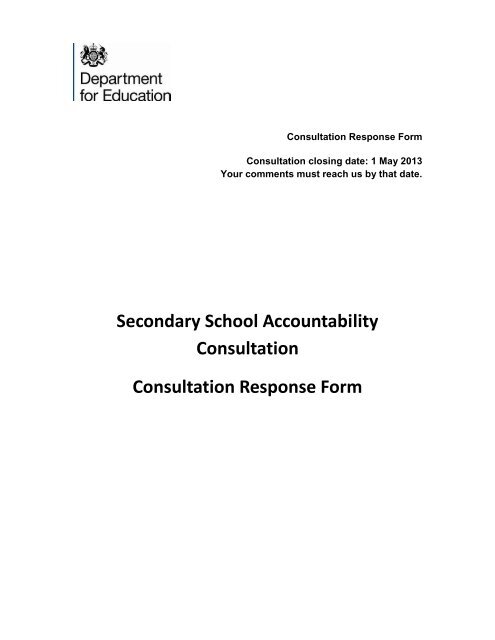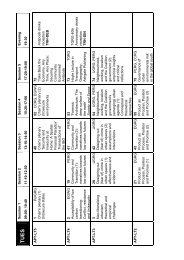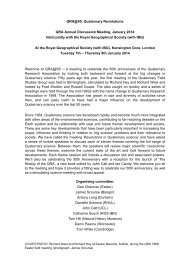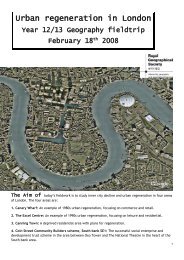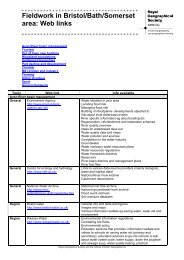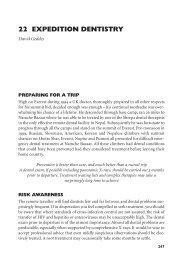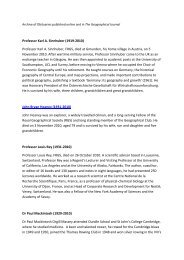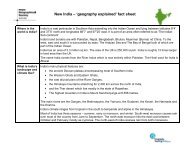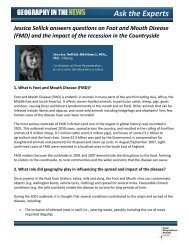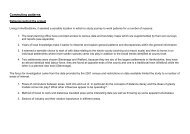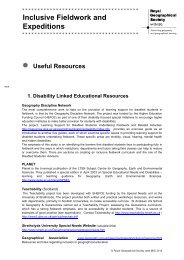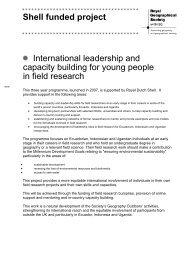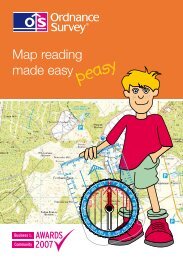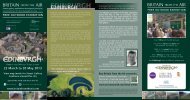Consultation response (PDF) - Royal Geographical Society
Consultation response (PDF) - Royal Geographical Society
Consultation response (PDF) - Royal Geographical Society
You also want an ePaper? Increase the reach of your titles
YUMPU automatically turns print PDFs into web optimized ePapers that Google loves.
<strong>Consultation</strong> Response Form<br />
<strong>Consultation</strong> closing date: 1 May 2013<br />
Your comments must reach us by that date.<br />
Secondary School Accountability<br />
<strong>Consultation</strong><br />
<strong>Consultation</strong> Response Form
Information provided in <strong>response</strong> to this consultation, including personal information,<br />
may be subject to publication or disclosure in accordance with the access to information<br />
regimes, primarily the Freedom of Information Act 2000 and the Data Protection Act<br />
1998.<br />
If you want all, or any part, of your <strong>response</strong> to be treated as confidential, please explain<br />
why you consider it to be confidential.<br />
If a request for disclosure of the information you have provided is received, your<br />
explanation about why you consider it to be confidential will be taken into account, but<br />
no assurance can be given that confidentiality can be maintained. An automatic<br />
confidentiality disclaimer generated by your IT system will not, of itself, be regarded as<br />
binding on the Department.<br />
The Department will process your personal data (name and address and any other<br />
identifying material) in accordance with the Data Protection Act 1998, and in the<br />
majority of circumstances, this will mean that your personal data will not be disclosed to<br />
third parties.<br />
Please tick if you want us to keep your <strong>response</strong> confidential.<br />
Reason for confidentiality:<br />
Name<br />
Dr Rita Gardner CBE<br />
Organisation (if applicable) <strong>Royal</strong> <strong>Geographical</strong> <strong>Society</strong> (with IBG)<br />
Address:<br />
1 Kensington Gore<br />
London<br />
SW7 2AR<br />
If your enquiry is related to the DfE e-consultation website or the consultation process in<br />
general, you can contact the Public Communications Unit by e-mail:<br />
consultation.unit@education.gsi.gov.uk or by telephone: 0370 000 2288 or via the<br />
Department's 'Contact Us' page.
Please mark an 'x' in the box that best describes you as a respondent.<br />
Teacher Head teacher School<br />
Parent-Carer Local Authority Awarding Body<br />
Subject Association Union X Other<br />
Please Specify: The learned society & professional body for geography & geographers<br />
The <strong>Royal</strong> <strong>Geographical</strong> <strong>Society</strong> (with IBG) is the learned society and professional body<br />
for geography and geographers. The <strong>Society</strong> maintains a strong overview of the<br />
discipline, its standing and its practice in schools, higher education, and the workplace,<br />
including professional accreditation. We advise on and support its advancement,<br />
dissemination and practice in these realms and within wider public engagement and<br />
policy. We have 16,500 members and Fellows and our work currently reaches more<br />
than three million people per year. Each year the <strong>Society</strong> works with teachers and<br />
pupils from about 50% of English secondary schools and our online educational<br />
resources receive c. 1 million ‘user sessions’ annually.
1 Do you agree with the proposals for the headline accountability measures?<br />
Yes X No Not Sure<br />
Comments:<br />
The <strong>Society</strong> welcomes a broader measure and also the inclusion of only GCSEs and<br />
other high value qualifications. The previous situation where some vocational courses<br />
could be reported as equivalents to multiple GCSEs was unhelpful. In some schools<br />
this limited the opportunity for pupils to study the full range of academic GCSEs.<br />
The <strong>Society</strong> has one area of significant concern and a proposed small<br />
amendment that overcomes the concern.<br />
This is in relation to the fact that young people can qualify for the ‘measure of 8’, without<br />
studying either a humanities subject (either geography or history) or a language at<br />
GCSE.<br />
This is counter to the concept of a broad and balanced education and has the potential<br />
to close down options for young people at too early an age, rather than opening them<br />
up. It also runs counter to the spirit of the EBac which has done so much to boost<br />
academically focused subject-based learning, including the study of geography and<br />
history – the ‘civilising’ subjects that are essential to a well-balanced education. For<br />
example, entry levels for geography GCSE have, following the introduction of the EBac,<br />
reached their highest levels for more than 10 years, undoing much of the harm to the<br />
foundation subjects that was done by the current accountability measure and the way in<br />
which schools used it.<br />
The <strong>Society</strong> suggests a small, but important, amendment to the proposed ‘measure of<br />
8’. The <strong>Society</strong> believes the new measure should include a requirement for young<br />
people to study (alongside English and maths) at least one science, one modern or<br />
ancient foreign language and either history or geography at GCSE - within the group of<br />
their 8 qualifications. This would still leave plenty of capacity for those who (1) wished to<br />
specialise in all four separate sciences; or (2) study three arts or vocational subjects; or<br />
(3) top up’ with additional humanities or languages. However, it would secure breath<br />
and ensure all young people studied both a language and a humanity at GCSE,<br />
together with English, maths, a science and three other subjects/study areas.<br />
The <strong>Society</strong> recognises that not every pupil will be able to achieve this breadth and<br />
range of study at Key Stage 4. However, we believe that our suggested amendment<br />
should be applicable to the majority of pupils.
2 Is there any further information we should provide about the performance of<br />
disadvantaged students?<br />
Yes No Not Sure<br />
Comments:<br />
No comment made<br />
3 Should we look to use a relative measure as the floor standard in the first year<br />
of the new exams?<br />
Yes No Not Sure<br />
Comments:<br />
No comment made<br />
4 Are there any other measures we should consider publishing?
X Yes No Not Sure<br />
Comments:<br />
The <strong>Society</strong> strongly supports the continuation of the EBac and the reporting of pupils’<br />
achievement across the family of EBac subjects.<br />
5 Do you think we should collect and publish test data from internal assessments<br />
through the Data Warehouse?<br />
Yes No Not Sure<br />
Comments:<br />
No comment made
6 What other data could be published to create the right incentives for schools,<br />
including special schools, to ensure the best progress and attainment for all of<br />
their students?<br />
Comments:<br />
No comment made<br />
7 Do you agree that the Department should stop the collection of Key Stage 3<br />
teacher assessment results?<br />
Yes No Not Sure<br />
Comments:<br />
No comment made
8 How should we ensure that achievement beyond formal qualifications is<br />
recognised?<br />
Comments:<br />
The <strong>Society</strong> recognises that not every pupil will achieve formal qualifications at the end<br />
of Key Stage 4.<br />
In addition, not everything that a pupil experiences or achieves at school can be readily<br />
recognised through formal qualifications. For example, geographical fieldwork is an<br />
opportunity for pupils to work in a team and undertake research tasks together.<br />
However, the <strong>Society</strong> does not believe it is the place of geography GCSE examinations<br />
to attempt to assess a pupil’s ability in teamwork.<br />
The <strong>Society</strong> feels it is appropriate for all pupils to be provided with an end of Key Stage<br />
4 statement which should recognise their abilities, experiences and contribution to<br />
school life. This should complement the reporting of formal qualifications and be<br />
provided for all pupils.<br />
9 How can national sample tests best be introduced?<br />
Comments:<br />
The <strong>Society</strong> notes the Department’s interest in the provision of sample tests, such as<br />
the recognised suite of international tests in English, maths and science.<br />
The <strong>Society</strong> believes there is the need for a wider range of national sample tests to<br />
include tests on geography and history and potentially MFL.<br />
The <strong>Society</strong> would welcome further discussions with the Department to explore how<br />
best this might be achieved for geography.
Thank you for taking the time to let us have your views. We do not intend to<br />
acknowledge individual <strong>response</strong>s unless you place an 'X' in the box below.<br />
Please acknowledge this reply X<br />
E-mail address for acknowledgement: r.gardner@rgs.org<br />
Here at the Department for Education we carry out our research on many different<br />
topics and consultations. As your views are valuable to us, would it be alright if we were<br />
to contact you again from time to time either for research or to send through<br />
consultation documents?<br />
X<br />
Yes<br />
No<br />
All DfE public consultations are required to meet the Cabinet Office Principles on<br />
<strong>Consultation</strong><br />
The key <strong>Consultation</strong> Principles are:<br />
<br />
<br />
<br />
<br />
departments will follow a range of timescales rather than defaulting to a 12-week<br />
period, particularly where extensive engagement has occurred before<br />
departments will need to give more thought to how they engage with and consult<br />
with those who are affected<br />
consultation should be ‘digital by default', but other forms should be used where<br />
these are needed to reach the groups affected by a policy; and<br />
the principles of the Compact between government and the voluntary and<br />
community sector will continue to be respected.<br />
Responses should be completed on-line or emailed to the relevant consultation email<br />
box. However, if you have any comments on how DfE consultations are conducted,<br />
please contact Carole Edge, DfE <strong>Consultation</strong> Coordinator, tel: 0370 000 2288 / email:<br />
carole.edge@education.gsi.gov.uk<br />
Thank you for taking time to respond to this consultation.<br />
Completed questionnaires and other <strong>response</strong>s should be sent to the address shown<br />
below by 1 May 2013
Send by post to:<br />
Phil Elks<br />
Department for Education<br />
Level 2<br />
Sanctuary Buildings<br />
Great Smith Street<br />
London<br />
SW1P 3BT<br />
Send by e-mail to: accountability.consultation@education.gsi.gov.uk


